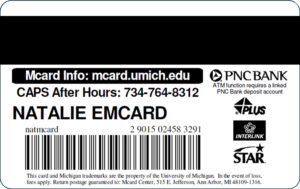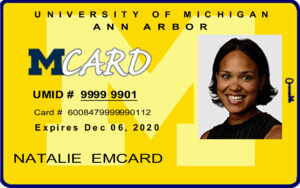The University of Michigan’s Counseling and Psychological Services center has taken yet another step toward its goal of ensuring the mental health and well-being of all students on campus.
CAPS, a unit in Student Life, teamed up with the Finance Office to get the CAPS After Hours hotline phone number printed on the back of every newly distributed Mcard. That means all incoming students and every successive class – as well as all students who get replacement Mcards – will have access to mental health services at their fingertips.
Todd Sevig, director of CAPS, says this is an unprecedented move that shows how devoted the university is to meeting the needs of its students.
“I’m not aware of any other college or university that is doing this. As best we know, the University of Michigan is the first to do this,” he says. “Being first isn’t the reason why we do things, but it is a testament to the good work we do on this campus and how we’re prioritizing student mental health on campus.
“It’s so cool and wonderful and groundbreaking to me for two reasons. It will literally touch every student and it’s a symbol that the university is committed to student mental health. It’s great to say that in catalogues and on a website, but now we have a companion element that is a real, concrete marker that says to students we really care about their mental health.”
The idea to provide this resource to students was borne from a community input session during President Mark Schlissel’s diversity summit in November 2015.
Allie Williams, a 2016 graduate in communications studies, spoke at the summit about the need for university administrators to take more action in promoting an inclusive environment for students with mental health issues.
In addition to speaking about the issue at the diversity summit, she also attended a fireside chat with Schlissel and used the opportunity to readdress her concerns about mental health.
“The fact that I was able to speak directly with the president was very heartening because it underscores the seriousness the university is placing on mental health of the student body and the importance of including students in the discourse about mental health resources,” Williams says.
“Instilling an inclusive, supportive and healthy environment in the U-M community is incumbent upon providing comprehensive mental health services. There are many admirable students, university staff and administrators who are passionate about improving mental health services, and empowering students to seek mental wellbeing. This initiative showcases how different members in the community can work together to reach a shared goal.”
The first Mcards with the CAPS After Hours hotline were distributed this spring during new student orientations, Sevig says. From there, the plan is to equip students with the newly branded cards at each orientation session going forward.
The need for more access to mental health comes at a crucial time for CAPS, as the number of students seeking its services has increased substantially year over year.
CAPS saw a nearly 25 percent increase in the number of students seeking mental health services from fall 2015 to fall 2016, with a significant increase in the number of first-year student visits.
During the school year, 4,446 students have requested services and scheduled nearly 25,000 clinical appointments. Additionally, there were 1,100 crisis/walk-in students to CAPS.
On average, CAPS sees approximately 130 new students each week. This is in addition to students who are being seen on a regularly basis and those in crisis situations. This year approximately 73 percent of students who have been serviced by CAPS have been seen for five or fewer appointments; 22 percent seen anywhere from six to 20 appointments; and 2 percent have been seen for 21 or more appointments.
In the last two years, CAPS has added seven staff members to its team to enact its embedded counselors program in schools and colleges, including North Campus. The office also will be adding four professional staff members in the fall to support both central and embedded models, and to support case/care management.
New funding also has been allocated to CAPS to further accomplish the mission of providing high-quality, easily accessible and student-centered mental health care. Specifically, funding has been allocated to further the clinical, educational and student engagement services the staff provides.
According to the 2014-15 CAPS annual report, the demand for mental health services increased by 17 percent – more than four times the expected increase based on previous years. This is not unique to the University of Michigan. Universities across the nation have seen an unprecedented demand for mental health services.
“Our staff works hard to support the students in every way we can, and these new resources – the new funding and the new positions we will add in the fall – will help us accommodate the students’ needs and the rising demand for mental health services,” Sevig says.
CAPS, the main unit on campus responsible for providing student mental health services, launched its After Hours Hotline Oct. 5, 2015, as a professional mental health service via telephone. The hotline is available before and after the CAPS office closes, on weekends and holidays to U-M students for urgent and crisis matters.
CAPS’ partner in its After Hours service, ProtoCall Services, has been providing professional mental health services over the phone since 1992, and serves more than 100 campuses and 2 million college students. The call centers are staffed exclusively by trained masters-level or doctoral-level mental health professionals. On-site clinical supervisors provide clinical and procedural consultation to the ProtoCall counselors, and they will work closely with CAPS clinicians to assure continuity of care for our students.
When a student calls CAPS After Hours, the counselor functions as an extension of both CAPS and U-M and will have access to existing U-M after-hours services such as the Sexual Assault Prevention and Awareness Center’s Crisis line, the University Health Service After Hours Nurse Line (with UHS physician back up), UMHS’s Psychiatric Emergency Services, the Dean of Students Office Critical Incident Team, Residence Education in University Housing, and the U-M Division of Public Safety and Security. The counselor will provide a live transfer of calls from CAPS to one of the other services or they will refer to other services as needed.
“I strongly believe that the Mcard initiative will be influential in de-stigmatizing mental illness on campus. Mental illness is not something to be ashamed of, and by placing this support line on Mcards it creates an environment for an open dialogue about mental health in the community,” Williams says.
Students can access the CAPS After Hours hotline by calling 734-764-8312. CAPS After Hours is made possible through a generous donation from the Gatof Family Foundation.



